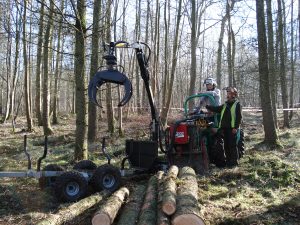Small scale timber harvesting and extraction 23rd March 2018

A feature of the English landscape is the small woodlands, of various types, scattered widely over the countryside. They are valuable assets for timber production, wildlife, game conservation, amenity use and in terms of landscape value. But a significant proportion of this resource is not in planned management. In 2011 the Forestry Commission estimated that almost 500,000 ha, or around 45 per cent of the total woodland area in England is un- or under-managed.
The comparative ‘smallness’ of these woodlands is part of the reason for this lack of management. Forest structure and economics have favoured bigger machinery. Compared to the cost of smaller machinery larger equipment can harvest or extract greater volumes of timber and provide a greater return. Ideally smaller-scale equipment needs to have:
- A low capital cost (minimising investment)
- Low transportation costs and overheads
- High manoeuvrability
- Ability to access un- or under-managed woodlands
- Flexibility to deal with different material sizes
- Potential compatibility with agricultural equipment
This demonstration seeks to provide information for the timber management of small woods, emphasising ways and means of implementing small-scale harvesting techniques and equipment. Exhibitors will be showing a range of smaller-scale equipment and techniques to unlock the potential of farm or small woodlands. It will help you to see how you can get the most out of your woodlands; give advice about small woodland produce, including woodfuel and consider how low-impact, silvicultural interventions may help make your smaller woodlands more productive.
This demonstration will be from 10.00am to 4.00pm at Bolton Abbey, Skipton, North Yorkshire on 23rd March 2018. Please book in advance by contacting Yorwoods or Rural Development Initiatives on 01765 609355 for more information, or e-mail Erica Spencer at erica.spencer@ruraldevelopment.org.uk
This event is being funded and co-organised by the Forestry Commission, Yorkshire Dales National Park Authority and the Nidderdale Area of Outstanding Natural Beauty.
